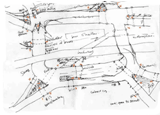Edited extract from a conversation between Peter Nicholson and Anna Best May 2004 at Transport For London Offices.
Anna
why so little green, I’m thinking about the history of the pleasure gardens
Peter
I can see that if you’re thinking in terms of a pleasure gardens it’s woefully little green, but we have tried to introduce some trees, as many as we can, there’s more where there were none.
Anna
what’s the limitation on trees., is there a point where too many become problematic
Peter
Well it’s about road space. If we introduce it we have to maintain it, we have to dig a hole to put it in and every hole we dug as I explained we found something in it. As I say we’ve introduced green areas, shrubs and planting, but it’s the same with any road, if you’ve got an avenue of trees you’re doing well these days aren’t you?
Anna
yes, in a way my question is a general one, it would make pedestrian life a lot more pleasant, maybe
Peter
well we’ve introduced as any as we feel we can
Anna
in terms of space, is that the main criteria
Peter
yes there again you see that tree has to compete for footway space, with pedestrian and also has to compete below groundwe’ve introduced root containment , we don’t want to compromise buildings or adjacent services
+++++++++++++++++++++++++++++++++++++++++++++++++++++++++++
Fact Sheets
No.12: Public Attitudes to Transport Survey 2002: London highlights————————————————————————————————————
Interviews were conducted with 421 people in London.
- Transport related issues are considered even more important in London than nationally – overtaking health to become the second most important issue facing Britain
- In particular, unreliable buses and trains and difficulty in using public transport are concerns for Londoners
- Locally, transport is equally as important to those in London as it is nationally, and again is the second most important issue behind crime
- Speeding motorists are not perceived to be as much of a problem compared with England as a whole
- Londoners are more likely to feel than those in the rest of the country that the Government is giving transport policy greater priority than it has in previous years (24% versus 18%)
- Usage of public transport in London is consistently higher than national levels – 79% use local buses (compared with 55% across England), 67% use local trains (compared with 44% across England) and 76% use the London Underground
- The main reason for using the Underground to get to work is speed. So improvements to bus journey times could influence some to switch to buses, especially if overcrowding increases on the Underground
- Car usage is lower than nationally (34% do not have a car in the household compared with 23% nationally). This is reflected in the results which show that public transport issues are much more important to Londoners than people in England as a whole
- Londoners are more likely to say that improvements to public transport will reduce their car travel
- More Londoners say they would use their car less if bus services, train services and conditions for walking were better
- Londoners are more likely to be fearful of travelling by public transport than nationally (26% compared with 19%)
- Londoners are generally less positive about conditions and services on buses, trains and the London Underground. However, they do rate the number of places accessed by buses and bus fares more positively than average, as well as cleanliness, personal security, overcrowding and attitudes of staff on the London Underground
- Overcrowding is much more of a concern for Londoners compared with the rest of the country and are also more pessimistic that overcrowding will improve in the next decade
- More feel that overcrowding will get worse on buses, trains and the London Underground than nationally; 58% on trains (compared with 46% across England), 50% on buses (compared with 32%) and 59% on London Underground (compared with 37%)
- Londoners are also more pessimistic about improvements in the level of public transport fares
- They are more optimistic about issues to do with roads, being less likely to feel that congestion, road safety and the cost of using a car will get worse
- Confirming the importance of public transport in the capital, Londoners are most likely to want revenues raised from congestion charging to be used to improve public transport (64% versus 58% across England)
